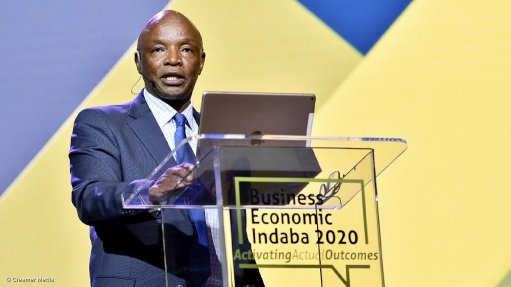
Izingwe Capital chairperson Sipho Pityana
Photo by: Creamer Media
Prominent businessman Sipho Pityana says the trust gap between business and society can only be closed when the private sector addresses the full spectrum of challenges faced in South Africa.
Pityana, as chairperson of Izingwe Capital, spoke during the Trialogue Business in Society virtual conference, which was held in the week of June 22.
He elaborated that business was rightly showing enthusiasm for the climate change agenda, but must consider whether business can be trusted with the environment when it showed indifference to the daily pain of race and gender discrimination, and the “condemnation of the many to the indignity of poverty”.
As South Africa emerged from what was a “ravaging era of State capture”, business needed to assess its commitment to ethical leadership and an inclusive growth agenda that does not reproduce the country’s historical patterns of inequality, he said.
Pityana drew attention to the role that businesses were increasingly expected to play in society. He cited research from the Edelman Trust Barometer, which showed that companies were now the most trusted institutions, ahead of nonprofit organisations, the government and the media.
While he highlighted the many pandemic initiatives that have allowed business to be viewed as a “trustworthy and reliable partner beyond profiteering”, such as working with the government to ensure the rollout and local manufacture of vaccines, he also warned that the private sector needed to drive an agenda for inclusive growth founded on meaningful social compacts.
“The pandemic and economic whirlwinds have created forced marriages between social partners, but we need to convert these into happy marriages where partners enjoy working together for the betterment of our country and continent,” Pityana asserted.
This will involve strengthening the trust between labour, government, business and society, as well as drawing neglected small- and medium-sized enterprises into supply chains, he added.
Pityana’s vision for the future includes partnering and sharing resources with other African countries, since no one country has adequate infrastructure to deal with these matters in isolation.
He suggested that Africa needed to craft its own agenda when it came to stakeholder capitalism, with business making sure that it lifted others up when pursuing opportunities.
He said enterprises could not thrive when education and health systems, as well as local government, did not function properly.
“We need to take our full citizenship as business, which is not just about enabling enterprises to make a profit but ensuring that we help societies to work successfully. It cannot be that we sleep peacefully at night with a large number of young people desperate for jobs.”